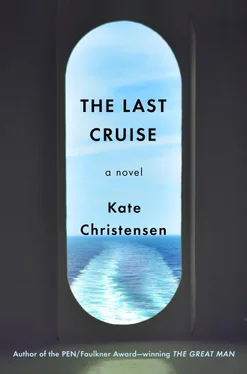“That’s right,” said Mick. “How can I help you?”
“I want to help you, actually,” she said. “I just talked to Sidney up in the breakfast room. He said maybe you could use a hand down here. I’m Christine.”
He was tempted to tell Christine, brusquely, to go back up to the breakfast buffet and leave all this to the crew, but he wasn’t sure there was a crew, and she was staring at him with a bug-eyed determination that made him pause.
“All right,” he said. “Follow me.”
He led her through the restaurant. Everything was still as it had been left the night before: tables set, shelves stocked for service, bar organized and gleaming. Ready for lunch. But with no crew to speak of and no power, lunch would most likely have to be basic, thrown-together sandwiches, which Mick suspected would not go over well with some of the passengers.
He stopped and turned to face her. He might as well tell this one before they all found out. “Here’s the thing, Christine. Most of the galley crew quit their jobs last night and walked out. Hard to do on a ship this size, but they’ve done it.”
She didn’t look entirely surprised. Maybe she’d already heard. “What happened?”
“They said they won’t do their jobs anymore unless management renews their contracts with better terms.”
“Wait. Why?” she asked. “Because of the fire?”
“Nothing to do with the fire. This is their last cruise. Their contracts are being canceled, and they’re pissed, so they decided to get their revenge.”
“How many?” she asked.
“I have no idea. I’m not even sure anyone will show up this morning.”
“Okay,” she said, clearly startled. “I’m happy to do whatever you need me to do. I’m a farmer, I used to be a waitress. I cook at a soup kitchen every week, anywhere from fifty to a hundred people. I know how to work.”
Mick made a frank assessment of her plain shorts and T-shirt, her earnest eagerness to help. Maybe she was okay, not the rich bitch he’d originally pegged her as. At any rate, he didn’t have the luxury of turning her down.
“Let’s go,” he said.
He led her through the doors and into the main galley, which was empty, silent, lit by the emergency track lighting, still smelling faintly of the harsh bleach-based cleanser he had used to mop up Laurens’s vomit, swabbing the floor and counters several times to try to wipe out whatever virus or bacteria he was harboring and had left behind. The dead stoves were shadowy through the gloom.
Christine looked around. “I could make coffee.”
Mick took a liter beaker from a shelf, filled it with tepid water, and took a long drink. “Can’t make coffee,” he told her, wiping his mouth on the back of his hand. “No electricity for the burners. Can’t boil water, can’t cook anything.”
“What about cold brew? I could start it now. You let it sit and then just strain it. I could make a huge batch.”
“Go for it. Your first assignment.”
He went to the locker room, pissed in the little toilet, tried to flush and couldn’t, and felt a sudden sense of dread. No plumbing. He put on a clean set of chef’s whites. Back in the galley, he tossed another to Christine: she put it on without having to be told. After he’d shown her where the coffee was kept, he went into the first walk-in refrigerator to take stock of the remaining supplies, the perishables that had to be eaten immediately.
A while later, as he emerged with a hotel pan of hard-boiled eggs, he heard voices.
“Morning, Chef,” said a young man with an Aussie accent.
Mick didn’t recognize the clean-cut blond kid, but he must have been on the morning crew. Or what was left of it. Behind him was a small cluster of people—eight, he counted—all wearing clean white jackets and neckerchiefs, exactly on time for their normal shift. He recognized a few of them from the main galley, one from his own station, a prep cook named Camille, dark and serious, with glasses.
Mick felt himself relax a little. So there was order in the world after all. The remnants of his exhaustion lifted, the scrim of grime around his vision cleared.
“Good morning,” he said. “Does anyone know what’s going on with the rest of the crew?”
“Most of them are on the main deck,” said Camille. “They’ve taken it over. I think they’re planning to stay there until we get to Hawaii.”
“Some of them are in the buffet galley,” said another young woman. She had an Indian accent, and Mick remembered her, though not her name, from the first day; he had put her in charge of service aesthetics in the buffet galley, because she had seemed to have a good eye. Then he’d come over here to the main galley and hadn’t seen her since. “They’ve taken that over too,” she was saying. “They’re eating breakfast in there. I’m supposed to be working there, but they said I couldn’t stay unless I joined them. But I didn’t want to. So they threw me out.”
“What about Chef Jean-Luc?” Mick asked. “Isn’t he in charge?”
“He’s joined the walkouts,” said the Aussie.
“Okay,” said Mick, trying to hide the shock he felt at this news. “I guess it’s just us then. Until others decide to show up. So let’s get started.”
He looked into their faces: they all looked frankly relieved to have found someone to tell them what to do. He glanced over at Christine, who was stirring coffee into cold water in a soup pot. She looked back at him with the same expectant, trusting expression everyone else had.
“By the way, everybody, this is Christine. She volunteered to help us out. So please treat her as one of the crew. Right now she’s cold-brewing some coffee, which is the only way we’re going to get it since the power’s still out, so you should be extra nice to her.” A couple of weak smiles. Good. “We’ll put out breakfast for the passengers first. Simple stuff like cereal, milk, fruit, hard-cooked eggs, anything immediately perishable. You two,” he said, pointing at Camille and the Aussie, “go up to the breakfast room and see what they’ve got, what they need. The rest of us are going to make a quick inventory of our stores, starting with the perishables: meats, dairy, fish, vegetables.” He could feel himself slipping into autopilot, running through the service as he had done a thousand times for executive chefs, trying to impress them. The pitch was the same, but now that there was no one to impress, he heard himself delivering it in a warmer tone, with less of an edge. “We’ll have to use as much of that as we can today. Lunch will be simple: cheese sandwiches, fruit salad, bags of chips, that sort of thing. As you all know, we can’t use the stoves. The desalination pumps are down, so we’ll have to ration whatever we have in the tank. Service will be paper and plastic from now on. For dinner tonight, we’re going to make a shitload of ceviche to use up as much of the seafood as we can. And salad, mostly lettuce, also cucumber and anything else that might spoil. We’re going to use the outdoor grills to cook meat, since we have plenty of charcoal left. But the main thing now is to figure out what goes bad first, and that’s what we’ll serve. Okay?”
There were nods all around, a chorus of “Yes, Chef.”
“Good,” he said, and found himself clapping his hands together and rubbing them, the way Laurens did at the end of staff meetings. “Let’s get to work.”
*
It had been her first night alone with Sasha in their shared cabin, and Miriam had spent most of it worrying about Isaac, down the hall in the cabin with Jakov. She missed him. She always knew how to comfort him, and he her. They would have kvetched and moaned together. Instead she had tried to match Sasha’s quiet forbearance all night. He had settled himself in their double bed and lain awake for hours, brooding in silence. He was always stoic and self-contained, philosophical about discomfort. When she tried to talk to him, to caress him, he responded at first but lapsed back into worried fulmination, so she left him alone. Maybe he had been thinking of his own wife. At some point it had hit her with sheepish sadness that she was being foolish; maybe she was too old to start over, too old to have a swooning new love affair.
Читать дальше












